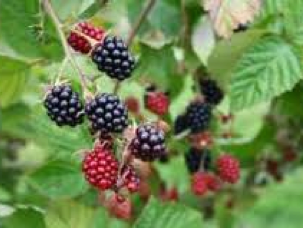
BLOG

Wednesday, September 7, 2011
Blackberry-picking
An old gardener once told me about blackberries’ “When they’re red they’re green and when they’re black they’re red.” By green, he meant, immature, like a young cowboy is a greenhorn. By red, he meant ripe. Of course, he had a green thumb, which meant he could nurture his garden, and I was green -envious - about his blackberries.
That’s maybe why fruit and flowers are so prevalent in poetry. They’re always symbolizing something. Also, let’s face it, when we are looking at flowers and fruit, we’re looking at the sex lives of plants. (I’m so glad people get together on their own instead of using bees.)
Finally, eating fruit is such a sensual pleasure. It’s sweet and fleshy and it gets on you. (Love, young ones, is messy.) And, as I’ve pointed out too often in this blog, fruit and flowers tend to look like body parts.
The language of this poem bears out that we tend to talk about fruit pretty much the same way we talk about sex. There’s a message, though...Don’t try to hoard experience. When we try to control sensuality, it gets rotten.
Late August, given heavy rain and sun
For a full week, the blackberries would ripen.
At first, just one, a glossy purple clot
Among others, red, green, hard as a knot.
You ate that first one and its flesh was sweet
Like thickened wine: summer's blood was in it
Leaving stains upon the tongue and lust for
Picking. Then red ones inked up and that hunger
Sent us out with milk cans, pea tins, jam-pots
Where briars scratched and wet grass bleached our boots.
Round hayfields, cornfields and potato-drills
We trekked and picked until the cans were full,
Until the tinkling bottom had been covered
With green ones, and on top big dark blobs burned
Like a plate of eyes. Our hands were peppered
With thorn pricks, our palms sticky as Bluebeard's.
We hoarded the fresh berries in the byre.
But when the bath was filled we found a fur,
A rat-grey fungus, glutting on our cache.
The juice was stinking too. Once off the bush
The fruit fermented, the sweet flesh would turn sour.
I always felt like crying. It wasn't fair
That all the lovely canfuls smelt of rot.
Each year I hoped they'd keep, knew they would not.
This poem is full of short o sounds...glossy, clot, knot, pot, bottom, blob, rot... The root “glot” means “having to do with the tongue, so it sounds like someone is tasting stuff throughout. Also, ending a word in a sharp stop is called a “glottal.” The whole first stanza sounds like it’s happening in one’s mouth!
Blood, tongue, lust, hunger...I never noticed how sexy short u sounds are.
Of course getting dirty and scratched and stained sounds pretty erotic. (Hey “erotic” has a short o in it.)
Note that the metal containers are man-made. Don’t try to contain or control natural pleasure in artificial constraints.
Bluebeard, in fairy tales, had a closet full of the bleeding corpses of his former wives. So his hands were sticky with life blood.
To me, the crux of this last stanza is ...”the sweet flesh would turn sour.” It makes me think of love affairs gone wrong, or just fizzling, and that always makes me feel like crying, too. Nature enjoys today; humanity tries to be greedy. We are ultimately made sad by our manipulating, but we never learn.
Maybe, though, Heaney is making an affirmation of the human spirit. Like fools, we’ll hope that each new love affair will last, even when we know the sweetness will ferment. And, hey, some people, the ones who make love last, seem to know the recipe for preserves.
